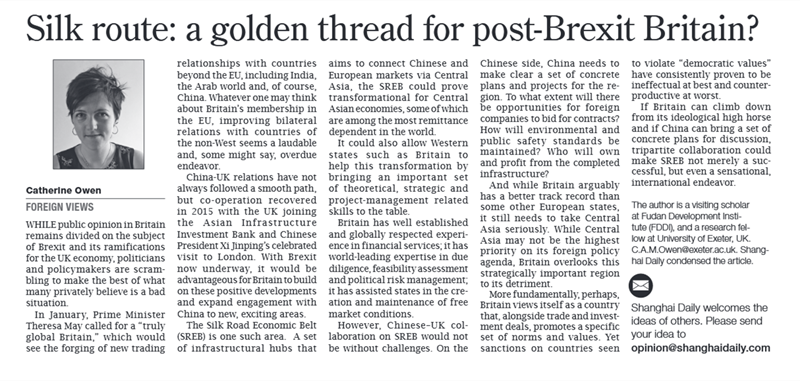作者: 发布时间:2017-06-27 来源:复旦发展研究院+收藏本文

WHILE public opinion in Britain remains divided on the subject of Brexit and its ramifications for the UK economy, politicians and policymakers are scrambling to make the best of what many privately believe is a bad situation.
In January, Prime Minister Theresa May called for a “truly global Britain,” which would see the forging of new trading relationships with countries beyond the EU, including India, the Arab world and, of course, China. Whatever one may think about Britain’s membership in the EU, improving bilateral relations with countries of the non-West seems a laudable and, some might say, overdue endeavor.
China-UK relations have not always followed a smooth path, but co-operation recovered in 2015 with the UK joining the Asian Infrastructure Investment Bank and Chinese President Xi Jinping’s celebrated visit to London. With Brexit now underway, it would be advantageous for Britain to build on these positive developments and expand engagement with China to new, exciting areas.The Silk Road Economic Belt (SREB) is one such area. A set of infrastructural hubs that aims to connect Chinese and European markets via Central Asia, the SREB could prove transformational for Central Asian economies, some of which are among the most remittance dependent in the world.
It could also allow Western states such as Britain to help this transformation by bringing an important set of theoretical, strategic and project-management related skills to the table.
Britain has well established and globally respected experience in financial services; it has world-leading expertise in due diligence, feasibility assessment and political risk management; it has assisted states in the creation and maintenance of free market conditions.
However, Chinese–UK collaboration on SREB would not be without challenges. On the Chinese side, China needs to make clear a set of concrete plans and projects for the region. To what extent will there be opportunities for foreign companies to bid for contracts? How will environmental and public safety standards be maintained? Who will own and profit from the completed infrastructure?
And while Britain arguably has a better track record than some other European states, it still needs to take Central Asia seriously. While Central Asia may not be the highest priority on its foreign policy agenda, Britain overlooks this strategically important region to its detriment.
More fundamentally, perhaps, Britain views itself as a country that, alongside trade and investment deals, promotes a specific set of norms and values. Yet sanctions on countries seen to violate “democratic values” have consistently proven to be ineffectual at best and counter-productive at worst.
If Britain can climb down from its ideological high horse and if China can bring a set of concrete plans for discussion, tripartite collaboration could make SREB not merely a successful, but even a sensational, international endeavor.
The author is a visiting scholar at Fudan Development Institute (FDDI), and a research fellow at University of Exeter, UK.
Source: Silk route: a golden thread for post-Brexit Britain?
For PDF version: ![]() Catherine Owen:Silk route a golden thread for post-Brexit Britain.pdf
Catherine Owen:Silk route a golden thread for post-Brexit Britain.pdf
Information about Fudan Development Institute Visiting Scholar Program
http://fddi.fudan.edu.cn/dongtai/tongzhigonggao/4797.html